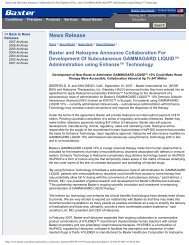IDF Patient & Family Handbook for Primary Immunodeficiency ... - IDFA
IDF Patient & Family Handbook for Primary Immunodeficiency ... - IDFA
IDF Patient & Family Handbook for Primary Immunodeficiency ... - IDFA
Create successful ePaper yourself
Turn your PDF publications into a flip-book with our unique Google optimized e-Paper software.
128 Health Insurance<br />
Who Are the “Payer Players”? continued<br />
state’s department of insurance. You generally<br />
have a choice of health plan options and will<br />
receive enrollment cards and other in<strong>for</strong>mation<br />
just like any other health plan. High-risk pools<br />
normally contract with a health insurance carrier or<br />
third-party administrator to administer paperwork<br />
and claims, so your enrollment card and other<br />
paperwork may not even appear to be produced<br />
by the high-risk pool. Once enrolled, you use your<br />
benefits just like any other consumer of private<br />
insurance coverage.<br />
Coverage options are very similar to traditional<br />
individual health insurance offerings. It is generally<br />
a comprehensive major medical plan with a range<br />
of deductible options. The most common riskpool<br />
option is a PPO plan, but many states also<br />
offer indemnity coverage and some states have<br />
HMO and/or HSA options available to consumers.<br />
Risk pool health insurance is more expensive than<br />
traditional individual insurance.<br />
Medicare<br />
Medicare is a federal health insurance program<br />
which provides coverage <strong>for</strong> people over the age<br />
of 65, blind, disabled individuals, and people<br />
with permanent kidney failure or end-stage renal<br />
disease. The Medicare program is administered<br />
by the Centers <strong>for</strong> Medicare and Medicaid<br />
Services (CMS) and pays only <strong>for</strong> medical services<br />
and procedures that have been determined as<br />
“reasonable and necessary.” Medicare is divided<br />
into three parts—Parts A, B, and D.<br />
Part A covers inpatient hospital services and<br />
certain follow-up care. This includes the cost of lab<br />
tests, x-rays, nursing services, meals, semi-private<br />
rooms, medical supplies, medications, necessary<br />
appliances, and operating and recovery rooms.<br />
Part B covers physician’s services and other<br />
medical expenses. Medicare Part B will cover both<br />
the IVIG product and administration when provided<br />
in a physician’s office or in the hospital outpatient<br />
setting. The coverage determination <strong>for</strong> IVIG is<br />
reviewed by each Medicare regional carrier through<br />
their medical policy department. Each carrier will<br />
issue their own local coverage determination (LCD),<br />
which outlines the specific coverage guidelines<br />
<strong>for</strong> the use of IVIG therapy. Since January 1,<br />
2004, the Medicare Part B program only allows<br />
coverage in the home setting. It is important to<br />
note that the home coverage provision is ONLY <strong>for</strong><br />
primary immunodeficiencies, and the coverage and<br />
reimbursement is only intended <strong>for</strong> the IVIG drug<br />
itself. Ancillary charges that may accompany the<br />
IVIG infusion are not covered under this provision.<br />
Beneficiaries must pay a monthly premium and a<br />
small deductible each year <strong>for</strong> all approved services<br />
covered under Part B.<br />
Part D The new Medicare Prescription Coverage<br />
program (Medicare Part D) went into effect on<br />
January 1, 2006. Anyone who has Medicare<br />
coverage can choose the new prescription<br />
coverage benefit. The new prescription<br />
benefit coverage was passed by Congress to<br />
give Medicare beneficiaries more options <strong>for</strong><br />
prescription drug coverage that had never be<strong>for</strong>e<br />
been covered under the Medicare program. As<br />
it relates to coverage of IVIG, the new Medicare<br />
Part D program DOES NOT cover IVIG in the<br />
home setting <strong>for</strong> those who have a primary<br />
immunodeficiency. However, Medicare Part D may<br />
cover IVIG in the home <strong>for</strong> other disease states.<br />
CMS administers the Part D program through<br />
contracts with commercial and private payers<br />
referred to as Medicare Prescription Drug Plans<br />
(PDPs). To learn more about the new prescription<br />
drug coverage go to www.medicare.gov, or call<br />
1-800-MEDICARE.<br />
For most of these services, Medicare pays 80%<br />
of the bill and the beneficiary pays the 20%<br />
coinsurance. You must first have Part A be<strong>for</strong>e<br />
receiving Part B. If you apply <strong>for</strong> Social Security<br />
disability, you will receive Medicare benefits after<br />
being on disability <strong>for</strong> two years.<br />
In many states, people covered under Medicare<br />
have the option of choosing between managed<br />
care and fee-<strong>for</strong>-service plans.<br />
Individuals may also consider purchasing a<br />
Medigap (supplemental insurance) policy. Medigap<br />
policies help pay some of the health care costs<br />
that your original Medicare plan will not cover.<br />
For instance, there are 12 different standardized<br />
Medigap policies (Plans A through L). Some of<br />
these plans will help pay <strong>for</strong> the 20% coinsurance<br />
under the Medicare Part B program. To learn<br />
more about the various plans and coverage<br />
guidelines go to www.medicare.gov/medigap,<br />
or call 1-800-MEDICARE.<br />
Medicaid<br />
Medicaid is a welfare program sponsored by<br />
both the federal and state governments, which is<br />
administered by the individual states. Coverage<br />
varies from state to state although each of the state<br />
programs adheres to certain federal guidelines.
















